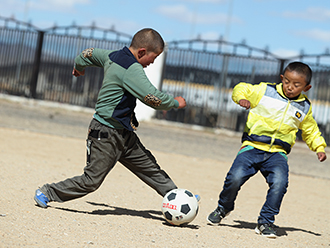From digging for cordyceps to back to school
Shangduke Township Central Primary School in Zamtang County, Ngawa Tibetan and Qiang Autonomous Prefecture of Sichuan Province just had the liveliest Children's Day in recent years. More than 500 people including teachers, students, and parents gathered together at the primary school's playground, as children happily participated in Tibetan circle dance and performed recitations and skits.
However, the scene would be totally different if time went back to five years ago. In this remote primary school, the classrooms would be empty and playground silent.
This village school has changed drastically over the last five years: the number of students has jumped from about 100 to more than 360. Children who used to spend May and June in digging cordyceps have returned to school for regular classes.
In Zamtang County, the annual per capita income is less than 8,000 yuan (1,177 US dollars). However, a single full-grown cordycep about 4 cm in length can be sold for 50 yuan (7 US dollars).
Cordyceps are wild and grow in alpine grassland areas about 3,000 and 5,000 meters high.
Children have good vision, and they are quick, so they can dig for cordyceps just as well as adults. For these reasons, they have become an important labor force for their family.
Driven by high prices, more and more people, including children, are joining in digging for cordyceps.
"When I arrived at the school in March 2011, I'd only have 15 students come to class half the month; usually just six would come," said 30-year-old Tseja, a Tibetan mathematics teacher. From May to June, sometimes only two students would come to school. The children were all out digging for cordyceps.
In 2012, 18 teachers in the school held a meeting to discuss how to solve the problem of students' cutting class and dropping out. At last, they decided to visit each student in his or her home to help them return to school.
But it was a hard task.
In order to find one student, a teacher named Pema Trinley rode a motorcycle 10 kilometers across a grassy mountain, and all his clothes were wet with mud. Another teacher, Sherab Tashi, rode 300 kilometers, over potholes and marshes, to find one student's family in Baima County, Qinghai Province.
In addition, Sichuan Province has promoted free education in recent years, which has lifted the economic burden off parents and allowed them to send their children to school.
Tou Sijie, a student of the fifth grade, said, "Every weekend, the teachers take we students who cannot go home to go climbing and play games. They also help us wash hair, wash our clothes and bedding, and make us feel as if we are at home."
The teachers' efforts have finally paid off.
At the start of the school year in September 2012, the first grade class had enrolled more than 60 students for the first time ever. Since then, the number of students has increased year by year, and the number of dropouts has steadily decreased.
Your Comment
Name E-mailRelated News
-
;
-
-

-
A volunteer teacher and her football stars in Tibetan-inhabited ar
She is praised as a Kelsang flower on the snow-covered Qinghai-Tibet Plateau; she took on a teacher's job in 2010, and won a number of awards in just a few years. She not only achieved remarkable achievements in teaching, but is also excellent as a football refere
-
-
-

-
Daily life of Lama Ngawang Peljor at Tibet's Rongpu Monastery
Rongpu Monastery, the world's highest monastery at the altitude of over 5,000 meters, located at the foot of Mount Qomolangma in Tingri County.
-
Based in Lhasa, Tibet Vista is a Tibet travel agency that specialized in Tibet permit, and Tibet tours for both private and group travelers at a local price!
•4 Days Lhasa City Group Tour from USD 460 •8 Days Everest Base Camp Group Tour from USD 850 •15 Days Mt.Kailash Group Tour from USD 1780 •2016 Tibet Train Tours from Beijing, Shanghai, Chengdu, Xining,etc










